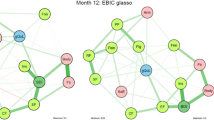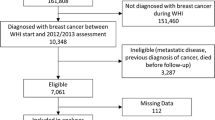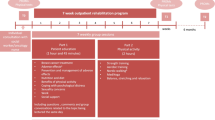Abstract
Goal of work
Aim of the present observational study is to focus on health-related quality of life (HRQL), mood and everyday life of breast cancer affected women disease-free 6 months after mastectomy, paying particular attention to the International Classification of Functioning, Disability and Health (ICF) framework contribution.
Materials and methods
Sixty-five breast cancer-affected women disease-free 6 months after mastectomy hospitalized for reconstructive surgery (mean age 46.3 ± 7.3) were enrolled. Their depressive symptoms (Beck Depression Inventory—BDI-II), HRQL, and every day life functioning/barriers and facilitators (ICF) were assessed.
Results
At the BDI-II, 6 patients (9.2 %) reported mild depression and 6 (9.2 %) severe depression; when the subscales were considered, 7 (10.8%) resulted depressed at the somatic–affective factor and 16 (24.6 %) at the cognitive factor. Compared to normative data no differences emerged at the HRQL Physical Component Summary (46.4 ± 9.3 vs 49.1 ± 10.1), whereas patients reported lower scores at the Mental HRQL Component Summary (45.9 ± 10.1 vs 51.5 ± 9.1; p = 0.00001 t = −4.3). As for the activity and participation domain, 11 of the 42 categories investigated were compromised in at least 20% of the sample: lifting and carrying objects (d430), acquisition of goods and services (d620), doing housework (d640), remunerative employment (d850), and many categories relating to interpersonal relationships; moreover the caregiver seems to be perceived as an important and positive modulator of disability.
Conclusions
The addition of the ICF evaluation to the usual psychological assessment gives a more complete picture, enabling a broader perspective of the psychological–clinical implications. Mainly, the women that we have evaluated continue to function in their everyday lives, thanks in part to their ability to accept help from their own families. However, they inevitably carry signs of their disease which some translating into problems with interpersonal relationships, depressive thoughts and negative ideation. Only the synergistic use of all these assessment instruments can one truly perceive all the nuances relating to the social and psychological conditions of the assessed patients’ life, overcoming a binomial vision of well-being and ill-being.
Similar content being viewed by others
References
Ahn SH, Park BW, Noh DT, Nam SJ, Lee ES, Lee MK, Kim SH, Lee KM, Park SM, Yun YH (2007) Health-related quality of life in disease-free survivors of breast cancer with the general population. Annals of Oncology 18:173–182
Ajovalasit D, Vago C, Usilla A, Riva D, Fidani P, Serra A, Gentile S, Massimino M, Biassoni V, Leonardi M (2009) Use of ICF to describe functioning and disability in children with brain tumours. Disabil Rehabil 31(Suppl 1):S100–107
Apolone G, Mosconi P, Quattrociocchi L, Granicolo EAL, Groth N, Ware JE Jr (2001) Questionario sullo stato di salute SF-12, versione italiana. Guerini e Associati Editore, Milano
Beck AT, Steer RA, Brown GK (1996) Beck Depression Inventory, 2nd edn. The Psychological Corporation Harcourt Brace and Company, San Antonio, Manual
Ghisi M, Flebus GB, Montano A, Sanavio E, Sica C (eds) (2007) BDI-II manual. Giunti OS Organizzazioni Speciali, Firenze
Berry DA, Cronin KA, Plevritis SK, Fryback DG, Clarke L, Zelen M, Mandelblatt JS, Yakovlev AY, Habbema JD, Feuer EJ, Cancer Intervention and Surveillance Modeling Network (CISNET) Collaborators (2005) Effect of screening and adjuvant therapy on mortality from breast cancer. N Engl J Med 353:1784–1792
Brach M, Cieza A, Stucki G, Füssl M, Cole A, Ellerin B, Fialka-Moser V, Kostanjsek N, Melvin J (2004) ICF Core Sets for breast cancer. J Rehabil Med (44 Suppl):121–127
Burgess C, Cornelius V, Love S, Graham J, Richards M, Ramirez A (2005) Depression and anxiety in women with early breast cancer: five year observational cohort study. BMJ 330:702–705
Cieza A, Bickenbach J, Chatterji S (2008) The ICF as a conceptual platform to specify and discuss health and health-related concepts. Gesundheitswesen 70:e47–56
Dow KH, Ferrell BR, Leigh S, Ly J, Gulasekaram P (1996) An evaluation of quality of life among long term survivors of breast cancer. Breast Cancer Res Treat 39:261–273
Fayed N, Schiariti V, Bostan C, Cieza A, Klassen A (2011) Health status and QOL instruments used in childhood cancer research: deciphering conceptual content using World Health Organization definitions. Qual Life Res 20:1247–1258
Giardini A, Ferrari P, Majani G, Negri EM, Rossi S, Magnani C, Preti P (2010) International Classification of Functioning Disability and Health (ICF) e Qualità della Vita nel paziente oncologico in fase avanzata di malattia. G Ital Med Lav Ergon 32(3 Suppl B):B29–36
Giardini A, Giorgi I, Sguazzin C, Callegari S, Ferrari P, Preti P, Miotti D (2011) Knowledge and expectations of patients in palliative care: issues regarding communication with people affected by life-threatening diseases. G Ital Med Lav Ergon 33(1 Suppl A):A41–46
Glaessel A, Kirchberger I, Stucki G, Cieza A (2011) Does the comprehensive International Classification of Functioning, Disability and Health (ICF) Core Set for Breast Cancer capture the problems in functioning treated by physiotherapists in women with breast cancer? Physiotherapy 97:33–46
Goldblatt H, Cohen M, Azaiza F, Manassa R (2012) Being within or being between? The cultural context of Arab women’s experience of coping with breast cancer in Israel. Psycho-Oncology. doi:10.1002/pon.3078
Irvine D, Brown B, Crooks D, Roberts J, Browne G (1991) Psychosocial adjustment in women with breast cancer. Cancer 15:1097–1117
Lampic C, Thurfjell E, Bergh J, Carlsson M, Sjoden PO (2003) Atteinment and importance of life values among patients with primary breast cancer. Cancer Nurs 26:295–304
Lollar D (2002) Public health and disability: emerging opportunities. Public Health Rep 117:131–136
Majani G (2011) Positive psychology in psychological interventions in rehabilitation medicine. G Ital Med Lav Ergon 33(1 Suppl A):A64–68
OMS (2003) Classificazione Internazionale del Funzionamento, della Disabilità e della Salute (ICF) ICF Checklist. Edizioni Centro Studi Erickson, Trento
Parkin DM, Bray F, Ferlay J, Pisani P (2005) Global cancer statistics, 2002. CA Cancer J 55:74–108
Perry S, Kowalski T, Chang C (2007) Quality of life assessment in women with breast cancer: benefits, acceptability and utilization. Heath Qual Life Outcomes 5:24
Pezzilli R, Campana D, Morselli-Labate AM, Fabbri MC, Brocchi E, Tomassetti P (2009) Patient-reported outcomes in subjects with neuroendocrine tumors of the pancreas. World J Gastroenterol 15:5067–5073
Pistrang N, Barker C (1998) Partners and fellow patients: two sources of emotional support for women with breast cancer. Am J Community Psychol 26:439–456
Reich M, Lesur A, Pedrizet-chevallier C (2008) Depression, quality of life and breast cancer: a review of the literature. Breast Cancer Res Treat 110:9–17
Seligman MEP, Csikszentmihalyi M (2000) Positive psychology—an introduction. Am Psychol 55:5–14
Shimozuma K, Ganz PA, Petersen L, Hirji K (1999) Quality of life in the first year after breast cancer surgery: rehabilitation needs and patterns of recovery. Breast Cancer Res Treat 56:45–57
Somerset W, Stout SC, Miller AH, Musselman D (2004) Breast cancer and depression. Oncology 18:1021–1034
Tschiesner U, Linseisen E, Becker S, Mast G, Rogers SN, Walvekar RR, Berghaus A, Cieza A (2010) Content validation of the international classification of functioning, disability and health core sets for head and neck cancer: a multicentre study. J Otolaryngol Head Neck Surg 39:674–687
Tschiesner U, Oberhauser C, Cieza A (2011) ICF Core Set for head and neck cancer: do the categories discriminate among clinically relevant subgroups of patients? Int J Rehabil Res 34:121–130
Tsauo JY, Hung HC, Tsai HJ, Huang CS (2011) Can ICF model for patients with breast-cancer-related lymphedema predict quality of life? Support Care Cancer 19:599–604
Ware JE Jr, Sherbourne CD (1992) The MOS 36-item short form health survey (SF-36). I. Conceptual framework and item selection. Med Care 30:473–483
Ware JE, Kosinski M, Keller SD (1996) A 12-item short-form health survey: construction of scales and preliminary tests of reliability and validity. Medical care 34:220–233
World Health Organization (2001) ICF-International classification of functioning, disability and health. WHO Library, Geneva
World Health Organization (2009) World Cancer Report 2008. International Agency for Research on Cancer, Lyon
Acknowledgments
This research was conducted with the support of the Extraordinary National Cancer Program 2006 “ISS for ACC” Project, WP 2. QUALITA’ DI VITA E ICF IN PAZIENTI ONCOLOGICI.
Conflict of interest
The authors do not have conflicts of interest, have full control of all primary data, and allow the journal to review their data if requested.
Author information
Authors and Affiliations
Corresponding author
Rights and permissions
About this article
Cite this article
Anna, G., Camilla, P., Ines, G. et al. ICF, quality of life, and depression in breast cancer: perceived disability in disease-free women 6 months after mastectomy. Support Care Cancer 21, 2453–2460 (2013). https://doi.org/10.1007/s00520-013-1794-7
Received:
Accepted:
Published:
Issue Date:
DOI: https://doi.org/10.1007/s00520-013-1794-7




